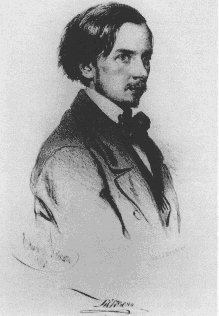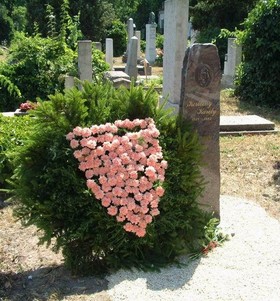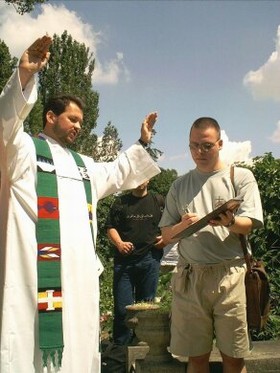|
Speech inaugurating a new tombstone for Károly Kertbeny (Made on 29th June 2002, in Kerepesi cemetery; the video film can be seen in Hungarian for broadband and dialup connection at Gay.hu, and you can look at further pictures as well at Gay.hu and Pride.hu.) 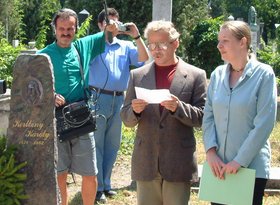 László Láner:
László Láner:… Through the collective will of two gay associations and two local businesses, and as the result of their joined forces, this monument has been completed. A lasting remembrance has been erected by the gay community to Károly Kertbeny, the almost-forgotten writer, who coined the word ‘homosexuality’. Sociologist Judit Takács’s research shed light on the fact that the internationally renowned author lay here, in Fiumei Úti Nemzeti Sírkert (Fiumei Street National Cemetery). At the invitation of Lambda Budapest Gay Fellowship, the gay community took action, and it has erected this memorial pillar by public subscription, which may also be a symbol of this community’s solidarity. We owe thanks for the monument to Connection Partnership, Háttér [“Background”] Support Society for LGBT People, Magnum Sauna, the 35 contributors who remain anonymous, and last but not least, Judit Takács. Now I ask Judit Takács, who knows Károly Kertbeny’s life the best, to tell us about the author whose memorial we are inaugurating today.
120 years ago the same man was commemorated in the same cemetery as follows: “He devoted his life to serving his country, even when he was living abroad. He publicised our glory there amongst foreign peoples. His first literary activities were received with mockery, but he did not give up and he brought light to Hungarian literature for foreign people.” (József Komócsy 1882) 35 years later, in 1917, a Hungarian writer, Lajos Hatvany referred to Kertbeny in this way: “this moody, fluttering, imperfect writer is one of the best and undeservedly forgotten Hungarian memoir writers”. Today we gathered here to pay our respects to the works of Kertbeny – as we can state with certainty that he created something lasting he longed for his whole life. Kertbeny Károly Mária – or in his original name Karl Maria Benkert – was born in Vienna on the 28th of February in 1824 – according to his autobiographical notes – “as a son of Hungarian parents”. He moved to Hungary with his family in 1826, and changed his name from Benkert to Kertbeny in 1847. Between 1846 and 1875 he criss-crossed Europe and returned to Hungary in 1875 where the ailing, old writer was provided with an apartment in the Rudas bath house by the city of Budapest. Kertbeny died on the 23rd of January in 1882: he did not have any relatives so he was buried at the expense of the writers’ mutual society. In Hungarian literary history he is remembered as a not too significant translator and writer whose greatest literary merit was the enthusiastic intention to popularise Hungarian literature* abroad, particularly in German speaking countries.
Kertbeny was born in Vienna, his mother tongue was German, but he declared himself Hungarian: “I was born in Vienna, yet I am not a Viennese, but rightfully Hungarian”, he wrote in a letter in 1880. He clearly had great literary ambitions but in anonymously published political pamphlets he broke a lance for the rights of homosexuals and constructed a whole theoretical system around the case for homosexual emancipation; he determined himself on several occasions – perhaps overly so – as a “normalsexual”, i.e. heterosexual. However, according to his personal diaries he was certainly not insensitive to male beauty. The tracks he left are difficult to trace, since – in the words of Hungarian writer, Ferenc Móra in 1936 – “With him Wahrheit und Dichtung [reality and fiction] are very much mixed up: he is often mistaken when talking about others but he is least reliable when referring to himself”. Kertbeny’s figure was distinguished by these dualisms. His adventures can be interpreted as multiple identity seeking attempts that he could not avoid because in the era of 19th century monolithic identities, due to the lack of social acceptance, he was not Hungarian enough, not literary enough, and perhaps not even “normalsexual” enough. Kertbeny wanted to be successful and create something lasting in literature. However, nowadays we can remember him primarily because of the novelties in sexual terminology he created: he was the one who coined the expressions homosexual and heterosexual in the late 1860s, as uncovered by the German researcher, Manfred Herzer. Today, many perceive the word homosexual to be a medical term, mainly because of the fact that from the late 19th century until the 1970s this expression was monopolised by the medical approach interpreting same-sex attraction to be a pathology, degeneration or illness. Still, it is important to remember that Kertbeny introduced the word homosexual in the course of the struggle for homosexuals’ rights in a surprisingly modern human rights argumentation.
“To prove innateness … is a dangerous double edged weapon. Let this riddle of nature be very interesting from the anthropological point of view. Legislation is not concerned whether this inclination is innate or not, legislation is only interested in the personal and social dangers associated with it … Therefore we would not win anything by proving innateness beyond a shadow of doubt. Instead we should convince our opponents – with precisely the same legal notions used by them – that they do not have anything at all to do with this inclination, be it innate or intentional, since the state does not have the right to intervene in anything that occurs between two consenting persons older than fourteen, which does not affect the public sphere, nor the rights of a third party.” Looking back almost one and a half centuries we can state that the case made by Kertbeny helped a significant, modern social movement – the struggle against the discrimination of those who enjoy same-sex relationships – to emerge. I believe that the inauguration of Kertbeny’s new tombstone today also serves to remind us – and others, too – of the importance of struggling against any form of unlawful social discrimination. Today’s celebration honours Kertbeny – and all those who stand for the respect of human dignity. The fact that we are here, that this celebration could be realised is the mark of solidarity that can give us strength and of which we can rightly be proud. This pride does no harm, rather it brings us closer together. We thank and acknowledge all who dared and still dare to be proud! My dear friends, I will read a short passage from Chapter 10 of The Books of Proverbs: “Blessings are on the head of the righteous, but the mouth of the wicked conceals violence. The memory of the righteous is a blessing, but the name of the wicked will rot.” We do not have to have great prophetic talents to grasp the meaning of this short passage. It is enough to look back to the recent or more distant past to see that dictators’ heads may be showing from the sand, the sands of oblivion, but the officers at the time were completely lost. The reason why this happens is that malevolence does not have and cannot have history, thanks to God, but only a supporting part goes to it, because the petty bourgeois’ means are limited. As a Christian, I believe that we can repair what happened, that we can restore dignity to people who had it taken away. Here and now, personally, to Károly Kertbeny, but at some period of our lives, to all of us. János Pilinszky [Hungarian poet], a few days before his death, in one of his last letters or maybe in his last one, wrote as follows: “I don’t care about my death. It would be best if they swept me into the earth naked. At the same time I perfectly understand that we keep the graves of our living ones tidy. It is they who now live, and we, dying to some degree, are blended with their ashes.” I believe that life has its direction, meaning and worth. I believe that each drop of blood and each teardrop matters; that life’s meaning can be found in John’s good news, which says: “Deus caritas est”, that is, “God is love.” That is why we do not bless a block of marble, or a tomb, but in his ashes, we bless Károly Kertbeny himself, because the memory of the righteous is a blessing indeed. [Blessing in Hebrew] The Lord bless you and keep you; the Lord make his face to shine upon you, and be gracious to you; the Lord lift up his countenance upon you, and give you peace. Amen. May the holy sign of our Lord Jesus Christ’s cross be upon you; the Saviour has saved you in this sign, and we have our salvation in this sign. Now we ask those sharing in our faith to say collectively the prayer that Jesus Christ left to us. Our Father in heaven, hallowed be your name. Your kingdom come. Your will be done, on earth as in heaven. Give us today our daily bread. Forgive us our sins, as we forgive those who sin against us. Lead us not into temptation, but deliver us from evil. For the kingdom, the power, and the glory are yours now and for ever. Amen. May peace be with you.
*: especially works of Sándor Petőfi and Mór Jókai – the website editor, quoted from the Hungarian version back
Sándor Petőfi and János Pilinszky are Hungarian poets and writers, Mór Jókai and Ferenc Móra are Hungarian novelists, and Lajos Hatvany is a Hungarian writer and literary historian. | |||
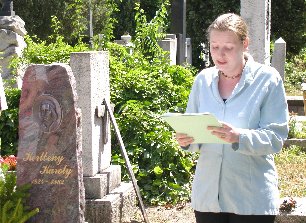 Judit Takács:
Judit Takács: